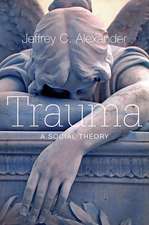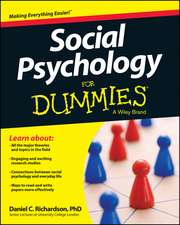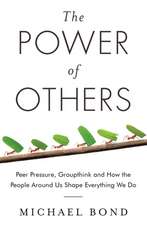Understanding Emotion in Chinese Culture: Thinking Through Psychology: International and Cultural Psychology
Autor Louise Sundararajanen Limba Engleză Hardback – 15 iul 2015
Included among the topics:
- The mirror universes of East and West.
- In the crucible of Confucianism.
- Freedom and emotion: Daoist recipes for authenticity and creativity. Chinese creativity, with special focus on solitude and its seekers.
- Savoring, from aesthetics to the everyday.
- What is an emotion? Answers from a wild garden of knowledge.
| Toate formatele și edițiile | Preț | Express |
|---|---|---|
| Paperback (1) | 484.08 lei 43-57 zile | |
| Springer International Publishing – 15 oct 2016 | 484.08 lei 43-57 zile | |
| Hardback (1) | 587.02 lei 43-57 zile | |
| Springer International Publishing – 15 iul 2015 | 587.02 lei 43-57 zile |
Din seria International and Cultural Psychology
- 18%
 Preț: 1117.03 lei
Preț: 1117.03 lei - 17%
 Preț: 490.68 lei
Preț: 490.68 lei - 15%
 Preț: 647.40 lei
Preț: 647.40 lei - 5%
 Preț: 718.10 lei
Preț: 718.10 lei - 24%
 Preț: 797.37 lei
Preț: 797.37 lei - 20%
 Preț: 564.51 lei
Preț: 564.51 lei - 18%
 Preț: 1693.62 lei
Preț: 1693.62 lei - 18%
 Preț: 1010.48 lei
Preț: 1010.48 lei - 18%
 Preț: 784.13 lei
Preț: 784.13 lei - 18%
 Preț: 780.52 lei
Preț: 780.52 lei - 18%
 Preț: 946.24 lei
Preț: 946.24 lei - 15%
 Preț: 641.85 lei
Preț: 641.85 lei - 18%
 Preț: 952.57 lei
Preț: 952.57 lei - 5%
 Preț: 1031.68 lei
Preț: 1031.68 lei - 15%
 Preț: 637.13 lei
Preț: 637.13 lei - 5%
 Preț: 708.78 lei
Preț: 708.78 lei - 15%
 Preț: 476.75 lei
Preț: 476.75 lei - 18%
 Preț: 1120.18 lei
Preț: 1120.18 lei - 15%
 Preț: 638.76 lei
Preț: 638.76 lei - 20%
 Preț: 556.09 lei
Preț: 556.09 lei - 15%
 Preț: 700.10 lei
Preț: 700.10 lei - 15%
 Preț: 703.52 lei
Preț: 703.52 lei - 5%
 Preț: 1095.90 lei
Preț: 1095.90 lei - 18%
 Preț: 999.94 lei
Preț: 999.94 lei - 24%
 Preț: 842.27 lei
Preț: 842.27 lei - 15%
 Preț: 646.62 lei
Preț: 646.62 lei - 18%
 Preț: 953.35 lei
Preț: 953.35 lei - 18%
 Preț: 892.74 lei
Preț: 892.74 lei - 5%
 Preț: 1098.27 lei
Preț: 1098.27 lei - 20%
 Preț: 552.44 lei
Preț: 552.44 lei - 15%
 Preț: 649.54 lei
Preț: 649.54 lei - 18%
 Preț: 785.55 lei
Preț: 785.55 lei - 18%
 Preț: 947.67 lei
Preț: 947.67 lei - 18%
 Preț: 947.98 lei
Preț: 947.98 lei - 18%
 Preț: 952.26 lei
Preț: 952.26 lei
Preț: 587.02 lei
Preț vechi: 690.62 lei
-15% Nou
Puncte Express: 881
Preț estimativ în valută:
112.33€ • 117.57$ • 93.49£
112.33€ • 117.57$ • 93.49£
Carte tipărită la comandă
Livrare economică 31 martie-14 aprilie
Preluare comenzi: 021 569.72.76
Specificații
ISBN-13: 9783319182209
ISBN-10: 331918220X
Pagini: 300
Ilustrații: XX, 210 p. 7 illus., 6 illus. in color.
Dimensiuni: 155 x 235 x 20 mm
Greutate: 0.5 kg
Ediția:1st ed. 2015
Editura: Springer International Publishing
Colecția Springer
Seria International and Cultural Psychology
Locul publicării:Cham, Switzerland
ISBN-10: 331918220X
Pagini: 300
Ilustrații: XX, 210 p. 7 illus., 6 illus. in color.
Dimensiuni: 155 x 235 x 20 mm
Greutate: 0.5 kg
Ediția:1st ed. 2015
Editura: Springer International Publishing
Colecția Springer
Seria International and Cultural Psychology
Locul publicării:Cham, Switzerland
Public țintă
ResearchCuprins
Part 1 Conceptual Foundations for the analysis of Chinese Emotions.- The Mirror Universes of East and West.- Harmony: A Delicate Dance of Symmetry.- In the Crucible of Confucianism.- On the Wings of Daoism.- Part II. Tracing Emotions daintily through Things Psychologically Chinese.- Heart-Aching Love (Teng, 疼).- The Art of Intimacy.- Freedom and Emotion: Daoist recipes for Authenticity and Creativity.- Being Spoiled Rotten (Sajiao 撒嬌): Lessons in Gratitude.- Part III. Chinese Creativity.- Chinese Creativity, with special focus on Solitude and its Seekers.- Savoring (Pin wei 品味), from Aesthetics to the Everyday.- Emptiness (Kong): Insight-based Emotional Transformations.- Part IV: Conclusion.- What is an Emotion? Answers from a Wild Garden of Knowledge.
Recenzii
“The book, on the whole, is insightful and dazzling in making interdisciplinary connections across psychology and related disciplines and it serves as a powerful example of articulating a sophisticated and elaborate theoretically informed indigenous psychology. … it will be of importance to cognitive psychology, cultural psychology, indigenous psychology, theoretical and philosophical psychology, anthropology, and Asian studies and to ongoing scholarly debates on the cultural meaning of emotions.” (Sunil Bhatia, Journal of Theoretical and Philosophical Psychology, Vol. 36 (4), 2016)
“Understanding Emotion in Chinese Culture by Louise Sundararajan is an elegant account of the ways in which emotions are experienced by Chinese people, and the book uses this discussion to enrich the Western psychological study of emotion. … Understanding Emotion in Chinese Culture offers a rich network of complexly nuanced ideas. … an eloquently constructed book that addresses difficult but important issues holistically within the context of naturalistic science. There are probably not many who would attempt such a task.” (Richard E. Duus, PsycCRITIQUES, Vol. 60 (48), November, 2015)
“Understanding Emotion in Chinese Culture by Louise Sundararajan is an elegant account of the ways in which emotions are experienced by Chinese people, and the book uses this discussion to enrich the Western psychological study of emotion. … Understanding Emotion in Chinese Culture offers a rich network of complexly nuanced ideas. … an eloquently constructed book that addresses difficult but important issues holistically within the context of naturalistic science. There are probably not many who would attempt such a task.” (Richard E. Duus, PsycCRITIQUES, Vol. 60 (48), November, 2015)
Notă biografică
Louise Sundararajan was born in Yunnan, China, and grew up in Taiwan. She received her BA in English Literature from Tunghai University, Taiwan, her Ph.D. in History of Religions from Harvard University, and her Ed.D. in Counseling Psychology from Boston University. She chairs the Task Force on Indigenous Psychology, which is joined by near two hundred researchers from around the globe. She served as past president of The International Society for the Study of Human Ideas on Ultimate Reality and Meaning, and also past president of the Society for Humanistic Psychology (Division 32 of the American Psychological Association). She is recipient of the Abraham Maslow Award for 2014, from Division 32 of APA. She is a Fellow of the American Psychological Association, and also a member of the Board of Directors for the International Society for Research on Emotions. She serves on the editorial boards of The Humanistic Psychologist, and Journal of Humanistic Psychology. She is Associate Editor for Journal of Theoretical and Philosophical Psychology. She has published extensively on topics related to culture and emotions. Outside academia, she practices psychology as a forensic psychologist, and enjoys the family life of a grandmother.
Textul de pe ultima copertă
This mind-opening take on indigenous psychology presents a multi-level analysis of culture to frame the differences between Chinese and Western cognitive and emotive styles. Eastern and Western cultures are seen here as mirror images in terms of rationality, relational thinking, and symmetry or harmony. Examples from the philosophical texts of Confucianism, Daoism, Buddhism, and classical poetry illustrate constructs of shading and nuancing emotions in contrast to discrete emotions and emotion regulation commonly associated with traditional psychology. The resulting text offers readers bold new understandings of emotion-based states both familiar (intimacy, solitude) and unfamiliar (resonance, being spoiled rotten), as well as larger concepts of freedom, creativity, and love.
Included among the topics:
Included among the topics:
- The mirror universes of East and West.
- In the crucible of Confucianism.
- Freedom and emotion: Daoist recipes for authenticity and creativity. Chinese creativity, with special focus on solitude and its seekers.
- Savoring, from aesthetics to the everyday.
- What is an emotion? Answers from a wild garden of knowledge.
Caracteristici
The book brings to light profound insight of the Chinese about the adaptive and creative functions of emotions Offers an in-depth understanding beyond stereotypes in its analysis of the thinking and feeling of the Chinese people The first systematic study of Chinese emotions from a theoretical framework that seeks to interrogate mainstream psychological theories and research on emotions Includes supplementary material: sn.pub/extras












